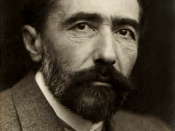In Joseph Conrad's "Heart of Darkness" the idea of epistemology plays a major role in understanding the plot and character development. It is this philosophical study that prompts Marlow to go off in search of the infamous Kurtz and then recount his story, and it is what compels the audience to read further into the book. However, to understand the presence of epistemology in "Heart of Darkness" it is crucial to know exactly what epistemology is.
The Merriam-Webster Dictionary defines epistemology as the study or a theory of the nature and grounds of knowledge especially with reference to its limits and validity. The Encarta encyclopedia gives this definition: Epistemology is concerned with the definition of knowledge and related concepts, the sources and criteria of knowledge, the kinds of knowledge possible and the degree to which each is certain, and the exact relation between the one who knows and the object known.
Simply put, epistemology is the search for knowledge. But how is this applicable to the Heart of Darkness?
There are three different examples of epistemology in the novel. One example is Marlow's search for truth when he goes off into the Congo looking to capture the illusive Kurtz. Another example is Marlow's describing of his experience to the shipmates of the Nellie in hopes of exposing them to the same knowledge he came upon learning. The third and final example of epistemology in Heart of Darkness is that of the person who reads: the truth or knowledge that the reader goes away with after having read the novel.
We first meet Marlow aboard the Nellie while speaking to the narrator and the other shipmates. These other shipmates represent who Marlow would have become had he not made the trip to Africa. They are ignorant...


